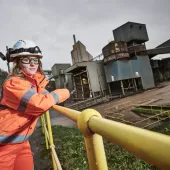MPA response to Spring Statement
Statement underlines mineral products’ strategic role in delivering growth and national security
THE Mineral Products Association (MPA) has welcomed aspects of the Government’s Spring Statement which, it says, presents opportunities for growth in construction and related industries. However, concerns remain over the downgraded growth forecast for 2025 and the potential implications for the sector.
The Office for Budget Responsibility’s revised growth forecast of 1.0% for 2025 reflects challenging global economic conditions. As suppliers of essential materials for construction and infrastructure, the mineral products sector is sensitive to changes in economic growth and investment levels.
The MPA says that while the Government’s reaffirmation of its ambitions for infrastructure and housing is welcome, effective delivery remains uncertain without a solid foundation of broader economic growth to support business confidence and investment.
The revised forecast follows the Chancellor of the Exchequer’s call on regulators to focus on growth in January; the MPA wrote to the Chancellor Rachel Reeves afterwards to welcome her approach and encourage her to go further.
Reforms to the National Planning Policy Framework, which the Office for Budget Responsibility estimates will increase annual house building by around 30% by 2029‑30, are also encouraging, says the MPA, and it is notable how much planning reform is forecast to contribute to growth from 2026 onwards. However, the Association cautions that achieving these targets will require careful planning and policies that ensure a reliable supply of essential construction mineral products, such as aggregates.
The Government’s commitment to an additional £13 billion in capital infrastructure investment, including defence, over the next five years is also said to be promising, but as much of this spending is backloaded from 2027/28, it will not provide immediate support to the industry amid the current construction slowdown. The MPA says it looks forward to greater clarity in the 10 Year Infrastructure Strategy expected later this spring.
It adds that the increase in defence spending of £2.2 billion for 2025-26, including projects such as the Portsmouth naval base regeneration and improved housing for military personnel, is a substantial investment and a reminder of the strategic role the aggregates and wider mineral products industry plays in delivering projects critical to national security.
Aurelie Delannoy, the MPA’s director of economic affairs, said: ‘The construction and mineral products industries are critical to delivering the Government’s growth ambition and strengthening our national security. However, subdued growth prospects over the next five years – with growth not surpassing the 2% in any year – poses real challenges, particularly for an industry that needs to plan long, and where investment involves high upfront costs. The sector needs clearer commitments on infrastructure investment and a planning system that effectively supports construction and housing delivery sooner rather than later.’
The MPA says the Government’s ambition must be underpinned by an effective procurement system that actively supports UK producers and manufacturers. MPA executive chair Chris Leese stated: ‘It is vital that the Government understands the importance of a public procurement policy that prioritizes domestically produced materials such as cement and concrete. A strong, resilient supply chain underpinned by UK-manufactured products is essential to stimulate economic growth, protect working people’s jobs, and meet national infrastructure needs.’
The MPA urges the Government to engage closely with industry stakeholders to ensure that planned reforms and investments deliver meaningful economic benefits while supporting the UK’s national security and transition to a net-zero economy.
Further industry responses to the Spring Statement
Lee Sleight, chief executive officer, Holcim UK: ‘While it is positive to see ambition to grow the economy and develop construction and infrastructure in the Spring Statement, we will have to wait and see if this brings the desired stimulation of the UK economy and our industry.
‘The future of sustainable growth for the construction industry is going to rely on the success of growth measures such as the recently announced funding for social housing, construction skills, and landmark projects like the Lower Thames Crossing. Funding can address some of the key challenges and barriers to kickstart growth in our industry, but there is more to be done by businesses and the Government to ensuring sustainable construction can be a reality across the UK.
‘The industry has faced a number of challenges over the years, including skills gaps, supply chain instability and delays causing materials shortages, rising costs amid inflation and market instability. We are committed to matching government ambition to deliver on the housing, construction, and sustainability targets, bring more sustainable building materials and solutions to the market, and support the industry with developing skills and bringing more talent into the sector.
‘However, unless the Government works together with the industry to address these endemic macro challenges, we risk missing an opportunity to create the policies, supply chain, and workforce needed to deliver construction projects sustainably and at scale.’
Construction Products Association (CPA): ‘With the impact of the Autumn Budget still fresh in people’s minds, we were not expecting much from today’s Spring Statement that would be directly relevant to UK construction, manufacturing, or distribution. The focus of the Chancellor’s Spring Statement was always likely to be on ‘difficult decisions’ regarding the pressure on government finances and increased defence spending in the light of greater global uncertainty and risks. As the onus was on the Government to stick to its fiscal rule, the options were to either increase taxes or cut spending, and the Chancellor focused on reducing day-to-day government spending across the civil service and social care to ensure that capital expenditure was broadly maintained from the Autumn Budget, which is positive.
‘Another positive is that the Spring Statement included an additional £2 billion in social and affordable housing in 2026‑27, which acts as a bridge to long‑term investment into social and affordable housing through to the government’s Spending Review in June. In addition, amongst an additional £2.2 billion for the Ministry of Defence, there will be an allocation to secure better homes for military families. The Government also reiterated that it is committing £625 million in England over four years to enhance existing training routes, ensure a sustainable flow of skilled construction workers, and support employers in investing in training, with the aim of delivering up to 60,000 additional skilled construction workers during this Parliament.‘However, the Office for Budget Responsibility (OBR), which produces the independent economic forecasts accompanying the Chancellor’s Spring Statement, now forecasts that house building in the UK over the five-year parliament will be 1.3 million net additional dwellings, which would approximate to around 1.0 million net additional dwellings for England. As the Government's target is 1.5 million net additional dwellings over the 5-year parliament in England (as housing and house building policy in Scotland, Wales and Northern Ireland is devolved), the Government will fail to meet its target by around 50%. However, this is in line with the CPA’s forecasts, and the CPA has been highlighting this to its members since the new government took office last year.’
Viki Bell, director of operations, Construction Equipment Association (CEA): ‘Labour’s ambition to fix the planning system and unlock house building is positive in principle – and the OBR’s suggestion that reforms could take us to a 40-year high in delivery is encouraging. However, much of what was discussed today has already been announced, and there was very little new information for the construction equipment sector.
‘The commitment to build 1.3 million homes and bring the target within ‘touching distance’ of 1.5 million is ambitious, and we continue to monitor this pledge. The £600 million to train 60,000 construction workers and set up 10 technical excellence colleges is a step in the right direction, and we will work to ensure this is delivered and aligned with industry needs.
‘Our members need practical support – clear timelines, a stable pipeline of work, and a commitment to UK manufacturing. Construction equipment is key to these deliverables, as is the battle against equipment theft, which is a clear strategic threat to these ambitious growth plans.
‘The good news was no further tax rises – but the sting for businesses came earlier this year, with increased national insurance. The real test will be the Autumn Budget.’










